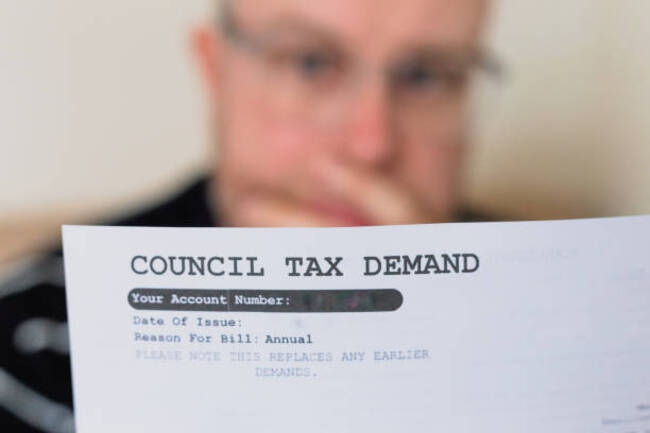Thousands of families across the UK are grappling with mounting council tax debt, as fresh data from Money Wellness reveals the ten local authorities where arrears are growing at alarming rates.
In each of these ten areas, more than 40% of residents turning to debt support services are behind on council tax payments – well above the national figure of 30%. Cannock Chase leads the list, with 45% of those seeking help in arrears, closely followed by Newcastle-under-Lyme at 43%.
The data comes just three months after households received their updated 2025–26 council tax bills. With living costs continuing to rise and household budgets under strain, the impact is now showing clearly – in the growing numbers of people unable to keep up with payments.
- Cannock Chase District Council – 45%
- Newcastle-under-Lyme Borough Council – 43%
- Calderdale Metropolitan Borough Council – 43%
- Stafford Borough Council – 43%
- South Staffordshire Council – 43%
- East Riding of Yorkshire Council – 42%
- West Lancashire Borough Council – 42%
- North Warwickshire Borough Council – 41%
- Stoke-on-Trent City Council – 41%
- Walsall Council – 40%
Residents who have fallen behind with council tax face serious consequences. Just one missed payment can trigger a demand for the full year’s bill to be paid within seven days. If that is not possible, the debt can quickly escalate, often leading to court summons, enforcement agents and added fees.
It is around this time of year – July and August – when free debt advice services like Money Wellness typically see an uptick in people seeking help. That is because households that missed their first payments in April are now starting to face enforcement action, which often kicks in after three missed payments.
Adam Rolfe, Policy and Public Affairs Officer at Money Wellness, said:
“These figures are a wake-up call. In some areas, nearly half of the people coming to us for debt advice are behind on their council tax. And that was before the latest council tax increases started to take effect.
“Now, three months on, the consequences are becoming clear for many households: the new rates are simply unaffordable.
“Council tax is just one of many bills people are struggling to keep up with. Over the past year, households have been hit with soaring energy prices, rising rents, and food costs that remain stubbornly high. Wages and benefits for many simply aren’t keeping pace, which has left more people dipping into savings – if they had any to begin with – or turning to credit to stay afloat.
“When people fall behind on council tax, it’s often because impossible choices had to be made between heating the home, feeding the family, or paying the council. What makes this debt particularly dangerous is how quickly it escalates. Missing one payment means the full year’s bill becomes due. If that can’t be paid, court action and enforcement fees soon follow.
“A fairer, more compassionate approach is needed – one that supports people to get back on track, rather than pushing them deeper into crisis. That’s why we applaud the Welsh Government for exploring reforms to make council tax collection more proportionate and supportive, and encourage other governments to follow suit. Their consultation on new rules to stop aggressive enforcement action, consider affordability, and ensure councils signpost to debt advice is a welcome step in the right direction. It’s time to stop treating financial difficulty as a failure and start offering people the practical help needed to recover.”
Money Wellness’ advice for those struggling with council tax:
- Talk to the council immediately
Waiting for reminder letters or enforcement action is not advised. Early contact with the local council can often result in support, such as new payment plans, spreading payments over 12 months, or a temporary payment break if money problems are short-term. - Check eligibility for discounts or reductions
People on low incomes or benefits could qualify for a Council Tax Reduction. Living alone usually means a 25% single-person discount applies. Some councils also offer discretionary hardship funds providing temporary support. The council’s website will have details on what is available. - Do not ignore letters or court warnings
Failing to respond may result in losing the option to pay in instalments and being asked to pay the full year’s bill at once. Councils can apply for a liability order and send enforcement agents, which adds significant fees and stress. Early responses give the best chance to avoid extra costs and legal action. - Seek free debt advice
When falling behind with priority bills like council tax, free and confidential advice is available. These services can help understand options, create budgets, and support regaining control of finances.



